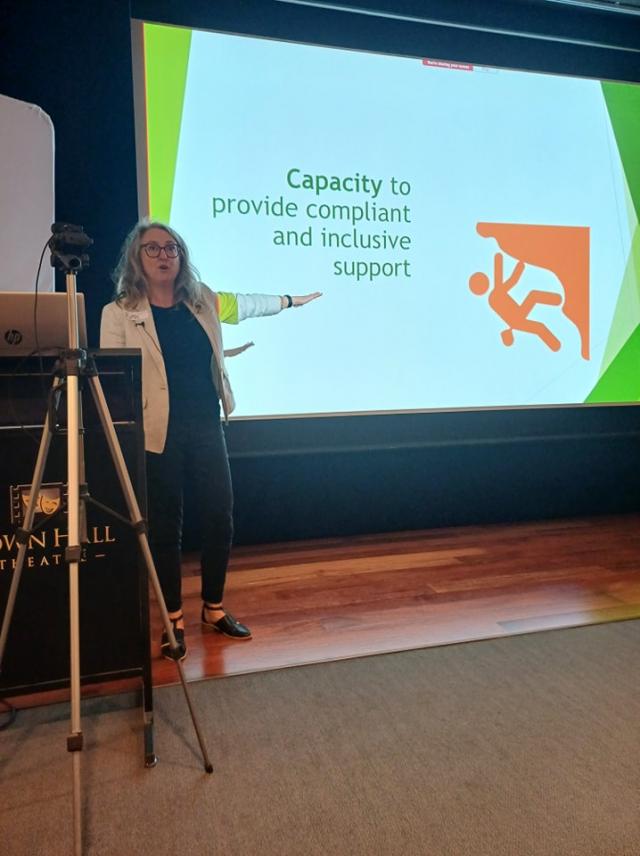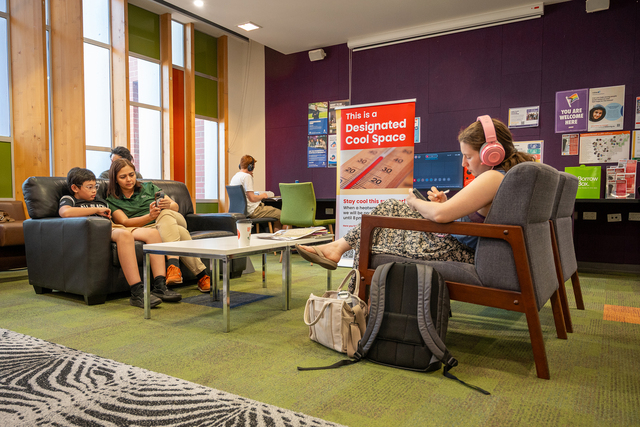In late 2023, Temora Shire Council and Temora Business Enterprise Group (TBEG), shared the detail of the newly released Temora Business Human Resources (HR) Needs Assessment with representatives present at the launch event from local businesses and schools, neighbouring Councils, RDA Riverina, Southern NSW Drought Hub, Department of Regional NSW, Department of Education, Australian Industry Group, Multicultural NSW, Department of Employment and Workplace Relations, TAFE NSW, Training Services NSW, and the Industry Capability Network.
Working in partnership, TBEG and Council received funding through the NSW GROW program to engage a specialist consultant, Ruth Sinclair of Sinclair Grace, to evaluate the HR capacity and capability of businesses in Temora Shire. The study aimed to better understand the barriers to workforce attraction, retention, and inclusivity.
Ruth walked attendees at the report launch through the process, outcomes, and key recommendations of the study. Attendees came from as far as Newcastle and Sydney to hear report findings.
“The report findings are clear, yet striking, with profound impacts for communities in regional Australia, and the recommendations invite an active and collaborative approach by industry and government,” said Ms Sinclair.
“Working together, we believe the insight from this study has the potential to positively impact small to medium enterprises throughout regional Australia, who are struggling to attract and retain skilled staff, and create inclusive and compliant workplaces,” explained Ms Sinclair.
The report states that Temora businesses are doing everything within their means and co-operative influence to attract, retain and support employment in Temora Shire for people from local and diverse backgrounds.
The need for increased HR compliance, employment, cultural diversity, training, and general implementation support is strongly recognised. However, also strongly recognised is the adverse impact of a larger Australian workforce, business, economic and social environment on local business’ ability to attract and retain a competent local workforce, despite best efforts to do so.
Businesses are struggling with the combined effects of COVID, social media, millennial workforce, cost of living increases, accommodation shortages, and lack of local education, cultural and support services. This struggle is amplified by the lack of resources locally available, to adequately initiate, support and sustain business compliance and diversity readiness.
Several proactive initiatives can be implemented locally. However, the lack of available resources and broader systemic impacts cannot be addressed by local business and regional community alone.
A multi-layered and integrated approach will be needed to impact this challenging scenario and effect lasting positive change.
“Currently, many businesses are feeling hamstrung; unable to meet operational demands and implement growth plans. Business, community, industry, government, policy makers and education providers will need to at least collaborate, and at best co-design, develop and implement a range of short-term actions, medium term interventions and longer-term strategies to realise the emerging vision in Temora and similarly challenged regional locations” continued Ms Sinclair.
The solution focuses on six key actions:
1. GET CONNECTED – Secure suitable independent HR expertise and implementation services and establish local forums to support compliance, diversity, and to strengthen business capability;
2. SET UP A ONE STOP SHOP – Establish a one-stop-shop for local business providing scalable access to HR services and support, and meeting a range of common training and other needs collaboratively and cost effectively;
3. GROW OUR OWN – Create integrated and formalised pathways for high school students and local citizens linking local community and high school initiatives, government programs, further education, professional development, and employment opportunities;
4. INVITE OTHERS – Partner with GROW program hub, relevant government departments, industry, TAFE and other education providers, and specialist businesses to collaboratively explore and innovatively meet identified needs;
5. MAKE SHORT TERM DECISIONS WITH THE LONG TERM IN MIND – Continue positioning and realising Temora as a realistically sustainable, attractive, and inclusive place for local, out of town and people from diverse backgrounds to work and live safely and meaningfully; and
6. THINK AND WORK COLLECTIVELY – Consider and integrate these recommendations considering existing and planned council, high school, community and other stakeholder strategies and activities to ensure clear cross-sight and best use of available resources for lean, effective, and sustainable implementation.
Following Ms Sinclair’s presentation of the study, the forum opened for collective brainstorming on solutions. All present agreed that these findings, while local, are challenges that are duplicated across all regional areas in NSW. To this end, there is now a strong cohort of local, regional, and state enthusiasm and commitment, which will be led by the TBEG and strongly supported by Temora Shire Council through the next step of a series of workshops.
“It is vital we have the right representation in the room for each action going forward, and that was the main aim of the launch in November. We are well on our way to achieving it after hearing the discussion,” concluded Ruth.
The final report is available on TBEG’s website tbeg.org.au

















